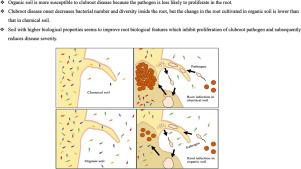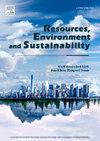Clubroot disease in soil: An examination of its occurrence in chemical and organic environments
IF 12.4
Q1 ENVIRONMENTAL SCIENCES
引用次数: 0
Abstract
Clubroot is a disease in cruciferous plants caused by the soil-borne pathogen Plasmodiophora brassicae. This pathogen rapidly spreads in soil, and plant growth is inhibited by infection with spores. To reduce clubroot disease, its prevalence in Brassica rapa var. perviridis was investigated in different soil environments (chemical and organic soils). The bacterial biomass, diversity, and community structure of the soils and roots were analyzed by environmental DNA, PCR-DGGE, and 16S rRNA sequencing. Bacterial biomass and diversity in the organic soil were higher than those in the chemical soil. The disease severity of plants cultivated in organic soil was lower than that in chemical soil. The number of endophytic bacteria in the roots decreased when the plants were infected with P. brassicae in both soil types. Higher bacterial biomass in the soils and roots appeared to reduce the infection of P. brassicae.

土壤中的球根病:研究其在化学和有机环境中的发生情况
球根病是由土传病原体黄铜质菌(Plasmodiophora brassicae)引起的十字花科植物疾病。这种病原体会在土壤中迅速传播,植物的生长会因孢子感染而受到抑制。为了减少棒根病,研究人员在不同的土壤环境(化学土壤和有机土壤)中调查了该病原体在 Brassica rapa var.通过环境 DNA、PCR-DGGE 和 16S rRNA 测序分析了土壤和根部的细菌生物量、多样性和群落结构。有机土壤中的细菌生物量和多样性均高于化学土壤。有机土壤中栽培植物的病害严重程度低于化学土壤。两种土壤中的植物感染铜绿微囊藻后,根部的内生细菌数量都有所减少。土壤和根部的细菌生物量越高,似乎就越能减少铜绿微囊藻的感染。
本文章由计算机程序翻译,如有差异,请以英文原文为准。
求助全文
约1分钟内获得全文
求助全文
来源期刊

Resources Environment and Sustainability
Environmental Science-Environmental Science (miscellaneous)
CiteScore
15.10
自引率
0.00%
发文量
41
审稿时长
33 days
 求助内容:
求助内容: 应助结果提醒方式:
应助结果提醒方式:


